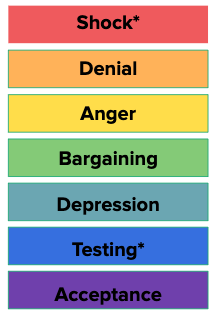There are 5 stages of grief that have been proposed by Elizabeth Keubler Ross. These include denial, anger, bargaining, depression and acceptance and make up the framework for learning to live without the person who has died (Clarke, 2020). Everyone moves through these stages differently and some may linger on one phase longer than the others, as some may even become stuck in a stage for months or years following the death that has occurred. People do not always move through their grief stages in a linear fashion, but rather a dynamic way where it may take longer in some stages than others, and do not always go in this particular order (Sanders, 2012).
A proposition has been brought forward suggesting the inclusion of shock and testing as well, making it a seven stage idea (Buckley, 2020).
Shock

- A stunning diagnosis, a quick phone call or a diagnostic test that announces something terribly wrong can start the onset of shock within an individual (Koblenz, 2015). This is the earliest stage and a person many may feel unable to comprehend what has occurred (Koblenz, 2015).
- Shock can last for a few moments or for many days (Koblenz, 2015).
Denial
- Denial is the first stage of grief that individuals experience (Koblenz, 2015). During this stage, the world can seem meaningless and devastating. An individual is in a state of denial and shock over the current situation (Koplenz, 2015). The world around them goes numb. One of the biggest worries is how they are supposed to go on, and if they can, then why should they (Koblenz, 2015).
Anger
- This is a necessary stage in the healing process (Koblenz, 2015). Being open to feeling anger even though it may seem never-ending is a crucial step in working towards acceptance of the situation (Koblenz, 2015). The more the individual allows themselves to feel this anger, the more it will begin to decrease, and the more they will begin to heal. Other emotions are present during this time, but anger is an emotion that we are most familiar with and know how to manage (Koblenz, 2015).
Bargaining
- Before a loss has occurred, individuals may try and do anything for their loved ones to have the chance to live (Koplenz, 2015). it seems like you will do anything if only your loved one would be spared (Koblenz, 2015). They may turn to religion, themselves and materialistic items in order to bargain for their loved ones life (Koblenz, 2015). During this time, people may confess to heir wrong-doings and insist that they will change in exchange for this favour (Koplenz, 2015).
Depression
- After bargaining, an individual’s attention reverts to the world around them (Koblenz, 2015). The onset of empty feelings, grief on a deeper level and ongoing sadness are common in individuals experiencing a loss. This depressive stage may feel as though it will progress forever, but it is important to understand that this is not a sign of a mental illness. This depression is situational and can be properly dealt with using certain strategies and resources (Koblenz, 2015).
Acceptance
- This stage of grief can often be confused with being “OK” or “all right”, however, this is not the case (Koplenz, 2015). Most individuals do not ever feel all right about the loss of a loved one. This stage is not about being okay with the situation, but acceptance that this is their new reality and that the individual has died(Koblenz, 2015).
Testing
- The testing stage of grief is similar to bargaining, however, it occurs later in the process. During this stage, an individual may experiment with different ways to manage their emotions (Koblenz, 2015). Testing is about finding strategies for living with the situation that are sustainable and positive (Koblenz, 2015).
(Counselor Carl, 2015)
These stages may be presented differently however in a child who has lost their parent or parents. In the beginning, they may not fully understand what is going on, why mom and or dad don’t want to see them anymore. They may act out, withdraw, or find other ways to cope with the loss.
It is said that people often question the best method of dealing with grief, especially with a very personal death such as a parent or parents. Many counselors suggest that instead of trying to deal with it, it is often best to feel the emotions and move through it, allowing yourself to fully feel and understand what you need (Smith, Robinson, & Segal, 2019). People may also have a sense of guilt, not understanding, and in other circumstances, some happiness may be felt if the parent was suffering. These feelings may also differ depending on how the parent died. Whether it is a chronic illness that takes them or sudden death. People may be stuck with more of a sense of guilt if their parent was taken suddenly and they feel if they had only been there they would have been able to intervene. On the other hand, at the end stages of cancer, a person may be happy that their parent is no longer suffering (Smith, Robinson, & Segal, 2019).